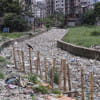Waterlogging: Mega project okayed to save port city
The government is going to take up a massive project to address the waterlogging in Chittagong city at a cost of Tk 5,616 crore.
Yesterday, the Executive Committee of the National Economic Council (Ecnec) approved the project for re-excavation, expansion and development of canals in the port city to be completed by 2020.
The Ecnec also gave the nod to another mega project under which Tk 1,325 crore would be spent for acquiring 5,580 acres of land in Moheshkhali of Cox's Bazar to build a coal- and LNG-based power hub.
After the Ecnec meeting, Planning Minister AHM Mustafa Kamal said the prime minister directed LGRD Minister Khandker Mosharraf Hossain to implement a more effective and extensive project to remove water from Chittagong city by forming a committee consisting of other institutions concerned.
He said the main objective of the project was to quickly drain rain water through excavation and expansion of concrete gutters connected to canals.
According to the planning ministry proposal, in 1995 Chittagong Development Authority (CDA) prepared a master plan for the commercial capital of the country. An important part of the plan was a modern drainage system and Chittagong City Corporation was responsible for implementing it.
In the last 20 years, the CDA proposal for the drainage was not implemented resulting in the complete collapse of the system.
After rain, most of the city streets go under knee-to-waist-deep water. During the high tide, low-lying areas of the city also become waterlogged.
Under the project, about 5.28 lakh cubic metres of dirt and 4.20 lakh cubic metres of sludge would be removed from 36 canals. About 11km of connecting drains would be built and 107 acres of land would be acquired.
The Ecnec approved the power-hub land acquisition project schedule for completion in 2018.
According to the proposal, coal- and LNG-based power plants would be set up in nine blocks for producing 13,560 megawatts of electricity.
In each of eight blocks, two 660MW coal-fired ultra super critical power plants would be set up. In the other block, four 750MW LNG-based combined-cycle power plants would be built.
The proposal also said Bangladesh Power Development Board (PDB) has signed Memorandum of Understanding (MoU) with three companies of Malaysia, China and South Korea for setting up coal-based power plants in three blocks.
At present the country has a power generation capacity of around 15,000MW and the government aims to take the capacity to 40,000MW by 2030.
The planning minister said locals, whose land would be acquired, would be trained and employed in the power hub.

 For all latest news, follow The Daily Star's Google News channel.
For all latest news, follow The Daily Star's Google News channel. 








Comments